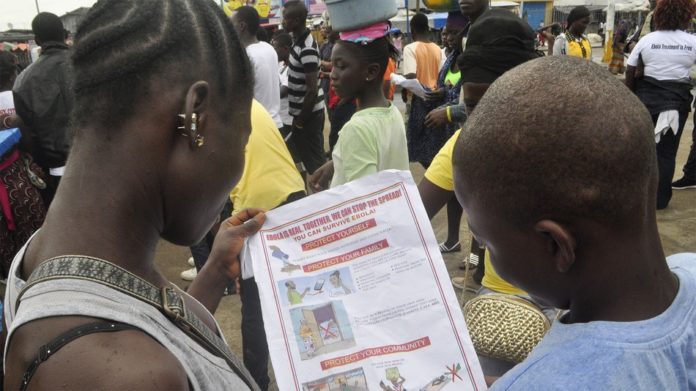In Ebola-Ravaged Liberia, No Education Plan for 1.4 Million Students

Ebola’s deadly grip on Liberia has forced education to fall by the wayside.
Public and private schools were shut down in July, and no additional plan was provided on how children would continue their education. Nearly three months later, the doors of the 4,413 schools remain closed with no indication of when they will reopen for 1.4 million school-aged children currently without access to education.
Education in Liberia has, understandably, taken a backseat to combatting the epidemic as more than 2,200 people have died from the virus. While communities mobilize to fight Ebola, little has been done to encourage continued education among school-aged children. Small community-driven initiatives have started, but no official government-led program currently exists.
UNICEF’s Rukshan Ratnam told Mashable that the organization is working on long-term options for students as schools show no signs of reopening.
“Discussions are beginning this week on the protocols and certifications needed for schools to reopen — as this will ensure that when schools do reopen, they remain safe environments for children,” Ratnam said.
UNICEF is working with Liberia’s Ministry of Education to develop educational radio programs for children, so they can continue studies in their own homes, according to Ratnam. These are planned to begin airing within the next month.
Stable education in Liberia is a relatively new thing since the country’s civil war ended in 2003. The More Than Me Academy, which provides education to vulnerable girls from Monrovia’s West Point slum, was among the schools directed to close in July.
“While this break seems dramatic to us, it may not be so strange to Liberians. If this goes on for a year, there may not be that much effort by communities to provide education to children, but if it goes on for longer, they might,” said Emily Bell, marketing manager for More Than Me, which provides education to vulnerable girls from Monrovia’s West Point slum. The school was closed in July.
“UNICEF is putting out home education resources, but we haven’t seen communities using them yet,” Bell said.
Since schools are closed, Bell said, they’ve been repurposed to deal with Ebola response. Many are running childcare centers for abandoned children. More Than Me, for example, has been working to quarantine children to monitor them for Ebola before they are placed in foster homes.
Loading
Day 5 feisty Pearlina shows no signs or symptoms of #ebola ! We are monitoring, praying, taking precautions and trying our best to make her feel safe and normal.
School teachers, who are held is high esteem in Liberian communities, and staff have pivoted from their traditional roles and now work to combat the spread of Ebola. UNICEF is currently training 300 teachers, who will then train 11,000 teachers, to engage in efforts to raise awareness on Ebola prevention at the community level.
Loading
Iris, our school nurse is currently leading a training on how to do ebola awareness in the community. She was certified as a trainer by UNICEF! Go, Iris!
Students unable to attend school also face increased risks.
“Our school acted as a safe place for students to come where they received food, medicine and counseling on top of the normal school day,” said Bell. “Our students are at higher risk for sexual abuse and transactional sex, and are getting sick more often without a school nurse.”
Loading
Children sitting outside next to where the ambulance waits to carry the family. West Point is a slum community and there is only 1 main road so the ambulance cannot transport people straight from their homes, they have to wait on the main road.
While they are unable to provide this security in their school facility, More Than Me is now working with those in their community of West Point to make sure resources are available to their students.
“We have a social work team that goes into West Point twice a week to check on each student,” said Bell. “We hand out preventative medicine such as vitamins and Advil, as well as health materials on Ebola, common illnesses and sexual/reproductive health to ensure our girls’ safety as much as possible during this time.”
While the school shows no signs of opening, UNICEF has also stressed a need for proper measures to be taken before reopening Liberia’s schools.
“Children have certainly been affected by this,” said Ratnam. “However, discussions are beginning this week on the protocols and certifications needed for schools to reopen — as this will ensure that when schools do reopen, they remain safe environments for children.”
Have something to add to this story? Share it in the comments.
